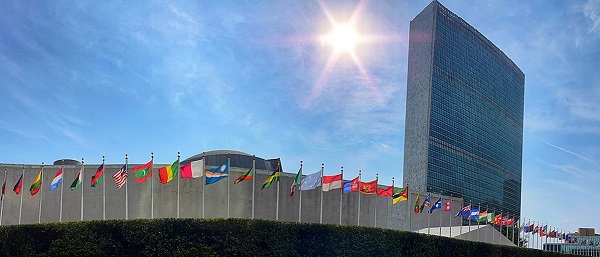Alberta
Alberta Justice Minister says Feds planning to use RCMP to confiscate firearms starting in PEI

Federal confiscation program: Minister Shandro
Minister of Justice Tyler Shandro issued the following statement on the federal firearms confiscation program:
“Last week, Minister Mendicino admitted that the federal government has still not figured out how to implement their firearms confiscation program.
“This admission comes shortly after the Canadian Association of Chiefs of Police called on the federal government to not to use police services to confiscate firearms.
“Now, media reports have drawn attention to a federal government memo that outlines Minister Mendicino’s plans to confiscate firearms across Canada.
“The memo admits that efforts to find private sector companies to implement the federal firearms confiscation program failed this summer.
“With no private sector companies willing to participate, the memo outlines how the RCMP will first be deployed to Prince Edward Island (PEI), which has been deemed to be an easy ‘low-risk’ target.
“The federal government is treating PEI as a ‘pilot’ that will help them learn on the job as they implement their confiscation plan through trial and error.
“This ‘program’ is expected to cost a billion dollars or more and has supposedly been in the works for three years.
“Despite a mountain of money and years worth of lead time, Ottawa appears to be lost – especially given their latest attack on hunting rifles and shotguns – at minimum, they should proactively extend the amnesty that is currently scheduled to end in October 2023.
“Such a decision, however, would involve showing Canadian firearms owners a measure of decency, something that Minister Mendicino and this federal government is seemingly incapable of.”
—–
Public Safety Canada’s Buyback Program
Overview
The Government of Canada committed to implementing a mandatory buyback program so that the assault-style firearms that became prohibited on May 1, 2020 are safely removed from our communities. Public Services and Procurement Canada’s role is to provide procurement services to Public Safety Canada (PS) to support their implementation of the buyback program.
Mandate
As of May 1, 2020, the Government of Canada has prohibited over 1,500 models of assault-style firearms (ASFs) and certain components of some newly-prohibited firearms. New maximum thresholds for muzzle energy and bore diameter are also in place. Any firearm that exceeds these is now prohibited. A Criminal Code amnesty period is currently in effect to October 30, 2023. The amnesty is designed to protect individuals or businesses who, at the time the prohibition came into force, were in lawful possession of a newly prohibited firearm from criminal liability while they take steps to comply with the law.
The primary intent of the buyback program would be to safely buyback these now prohibited firearms from society, while offering fair compensation to businesses and lawful owners impacted by the prohibition. PSPC is currently examining options for implementation of the buyback program, including the potential of contracting out specific activities.
Key activities
The program approach currently being considered by PS senior management envisages 2 phases, with a pilot in the first phase that would inform the national roll-out of the program:
- phase 1: commence in December 2022 and conclude at the end of the amnesty period. Primarily led by Royal Canadian Mounted Police (RCMP) with support from PS and other government departments. Prince Edward Island (PE) will be used as a pilot and will be the first point of collection based on the smaller number of firearms. As a result, lessons learned, gaps analysis and risk assessment would inform the phase 2 national roll-out
- phase 2: national roll-out is planned for spring 2023 once an information management/information technology (IM/IT) case management system is in place. It will be implemented in collaboration with other government departments, provincial, municipal and territorial governments and potential Industry partners
Public Services and Procurement posted a request for information on July 14, 2022 seeking feedback from industry on potential capacities to support delivery of the buyback program. It closed on August 31, 2022 and with very limited interest from the industry.
Partners and stakeholders
The program owner is Public Safety Canada. They are responsible for the buyback planning and oversight.
Public Services and Procurement Canada has been supporting PS with the buyback program since August 2021 supporting the development of procurement strategies for the delivery of the various potential requirements such as:
- collection and transportation
- professional services
- tracking
- storage solutions
- package inspection
- destruction
- post-destruction recycling
Shared Services Canada will assist with procurement of information technology (IT) solutions and other required IT support, based on its mandate.
The RCMP will start collection of ASFs in December 2022. They are also supporting the buyback program by providing a high level process map or written description of the programmatic phases.
Employment and Social Development Canada may support the buyback program with call-centres and payment solutions for the compensation.
Provincial, municipal and territorial governments are also being engaged to support the implementation and program delivery.
Key considerations
The prohibition applies to all current and future firearm variants that meet the criteria—now, over 1,800 firearms. These firearms can no longer be legally used, sold, or imported.
Currently owners have the option to dispose of their firearm by surrendering it to police, deactivating through an approved business or exporting the firearm with a valid export permit, all without government compensation. The buyback program aims to offer fair compensation to affected owners and businesses.
Work at the officials level is ongoing to develop, design and engage on the program. This includes public consultations on the government’s price list, which was posted on July 28, 2022 on Public Safety’s website and would be used to establish compensation levels for affected firearms.
Alberta
Busting five myths about the Alberta oil sands

Construction of an oil sands SAGD production well pad in northern Alberta. Photo supplied to the Canadian Energy Centre
From the Canadian Energy Centre
The facts about one of Canada’s biggest industries
Alberta’s oil sands sector is one of Canada’s most important industries — and also one of its most misunderstood.
Here are five common myths, and the facts behind them.
Myth: Oil sands emissions are unchecked

Steam generators at a SAGD oil sands production site in northern Alberta. Photo courtesy Cenovus Energy
Reality: Oil sands emissions are strictly regulated and monitored. Producers are making improvements through innovation and efficiency.
The sector’s average emissions per barrel – already on par with the average oil consumed in the United States, according to S&P Global – continue to go down.
The province reports that oil sands emissions per barrel declined by 26 per cent per barrel from 2012 to 2023. At the same time, production increased by 96 per cent.
Analysts with S&P Global call this a “structural change” for the industry where production growth is beginning to rise faster than emissions growth.
The firm continues to anticipate a decrease in total oil sands emissions within the next few years.
The Pathways Alliance — companies representing about 95 per cent of oil sands activity — aims to significantly cut emissions from production through a major carbon capture and storage (CCS) project and other innovations.
Myth: There is no demand for oil sands production

Expanded export capacity at the Trans Mountain Westridge Terminal. Photo courtesy Trans Mountain Corporation
Reality: Demand for Canadian oil – which primarily comes from the oil sands – is strong and rising.
Today, America imports more than 80 per cent more oil from Canada than it did in 2010, according to the U.S. Energy Information Administration (EIA).
New global customers also now have access to Canadian oil thanks to the opening of the Trans Mountain pipeline expansion in 2024.
Exports to countries outside the U.S. increased by 180 per cent since the project went into service, reaching a record 525,000 barrels per day in July 2025, according to the Canada Energy Regulator.
The world’s appetite for oil keeps growing — and it’s not stopping anytime soon.
According to the latest EIA projections, the world will consume about 120 million barrels per day of oil and petroleum liquids in 2050, up from about 104 million barrels per day today.
Myth: Oil sands projects cost too much
Reality: Operating oil sands projects deliver some of the lowest-cost oil in North America, according to Enverus Intelligence Research.
Unlike U.S. shale plays, oil sands production is a long-life, low-decline “manufacturing” process without the treadmill of ongoing investment in new drilling, according to BMO Capital Markets.
Vast oil sands reserves support mining projects with no drilling, and the standard SAGD drilling method involves about 60 per cent fewer wells than the average shale play, BMO says.
After initial investment, Enverus says oil sands projects typically break even at less than US$50 per barrel WTI.
Myth: Indigenous communities don’t support the oil sands

Chief Greg Desjarlais of Frog Lake First Nation signs an agreement in September 2022 whereby 23 First Nations and Métis communities in Alberta acquired an 11.57 per cent ownership interest in seven Enbridge-operated oil sands pipelines for approximately $1 billion. Photo courtesy Enbridge
Reality: Indigenous communities play an important role in the oil sands sector through community agreements, business contracts and, increasingly, project equity ownership.
Oil sands producers spent an average of $1.8 billion per year with 180 Indigenous-affiliated vendors between 2021 and 2023, according to the Canadian Association of Petroleum Producers.
Indigenous communities are now owners of key projects that support the oil sands, including Suncor Energy’s East Tank Farm (49 per cent owned by two communities); the Northern Courier pipeline system (14 per cent owned by eight communities); and the Athabasca Trunkline, seven operating Enbridge oil sands pipelines (~12 per cent owned by 23 communities).
These partnerships strengthen Indigenous communities with long-term revenue, helping build economic reconciliation.
Myth: Oil sands development only benefits people in Alberta
Reality: Oil sands development benefits Canadians across the country through reliable energy supply, jobs, taxes and government revenues that help pay for services like roads, schools and hospitals.
The sector has contributed approximately $1 trillion to the Canadian economy over the past 25 years, according to analysis by the Macdonald-Laurier Institute (MLI).
That reflects total direct spending — including capital investment, operating costs, taxes and royalties — not profits or dividends for shareholders.
More than 2,300 companies outside of Alberta have had direct business with the oilsands, including over 1,300 in Ontario and almost 600 in Quebec, MLI said.
Energy products are by far Canada’s largest export, representing $196 billion, or about one-quarter of Canada’s total trade in 2024, according to Statistics Canada.
Led by the oil sands, Canada’s energy sector directly or indirectly employs more than 445,000 people across the country, according to Natural Resources Canada.
Alberta
Click here to help choose Alberta’s new licence plate design

Your province, your plate
For the first time in more than 40 years, Alberta is refreshing its licence plate with a Strong and Free motto, and the final look will be decided by Albertans.
From Oct. 15 until Nov. 5, Albertans can take part in a tournament-style online vote for a new provincial licence plate design that proudly reflects who we are every time we hit the road.
The new licence plate will be available in late 2026 and will be based on a “Strong and Free” theme, echoing the Latin motto of our province and reflecting Alberta’s bold identity, economic strength and deep-rooted provincial pride. The motto’s inclusion on the licence plates will also serve as a nod to Canada’s national anthem and Alberta’s position as a strong and sovereign province within a united Canada.
“From our wide-open landscapes to our entrepreneurial spirit, Alberta has so much to be proud of, and our new licence plate will reflect that pride. For the first time in four decades, Albertans will choose how we tell that story. I look forward to seeing which design is selected to show the world that this is the land of the strong and free.”
With options that include famous Alberta landmarks such as the Three Sisters Mountains, and long-standing symbols of our province’s core industries including agriculture and energy production, the potential plates each contain symbols of Alberta’s beauty, history and spirit.
In the first phase of voting, Albertans can vote for their favourite of eight unique concepts that incorporate Alberta’s unique landscape and history. Following the first phase, four designs will advance to the next round of voting where the top two will be selected, and subsequently, there will be a final vote for the winning plate concept. The winning new licence plate will be announced during the fall session of the legislature.
“Alberta is strong and free, and Albertans will have the opportunity to choose a new licence plate that captures that spirit. The new licence plate will be a fresh design that every Albertan will be proud to show off, whether they’re driving to work, heading to the lake or exploring North America.”
If an Albertan wants to replace their current plate for the new licence plate once it is released, they can voluntarily pay a $28 fee. Alternatively, Albertans could obtain a new plate on their vehicle registration renewal date at no additional cost. Motorists may also continue using the previous licence plate once the new licence plate is brought onboard, provided it is still in good condition.
Quick facts
- Alberta’s current licence plate was designed in 1984.
- In 2021, Alberta began a transition from painted to reflective plates with the same design.
- The new designs each incorporate reflective technology to improve readability for law enforcement and automated systems in low-light conditions, and also meet international standards for visibility, legibility and counterfeit resistance.
Related information
Licence plate designs. Click link above to vote
-

 Alberta1 day ago
Alberta1 day agoClick here to help choose Alberta’s new licence plate design
-

 National1 day ago
National1 day agoDemocracy Watch Renews Push for Independent Prosecutor in SNC-Lavalin Case
-

 Business1 day ago
Business1 day agoOver two thirds of Canadians say Ottawa should reduce size of federal bureaucracy
-

 Business2 days ago
Business2 days agoTrump Admin Blows Up UN ‘Global Green New Scam’ Tax Push, Forcing Pullback
-

 Business2 days ago
Business2 days agoTrump Blocks UN’s Back Door Carbon Tax
-

 Media2 days ago
Media2 days agoCanada’s top Parliamentary reporters easily manipulated by the PMO’s “anonymous sources”
-

 Red Deer2 days ago
Red Deer2 days agoYour last minute election prep: Common Sense Red Deer talks to the candidates
-

 Agriculture2 days ago
Agriculture2 days agoIs the CFIA a Rogue Agency or Just Taking Orders from a Rogue Federal Government?






